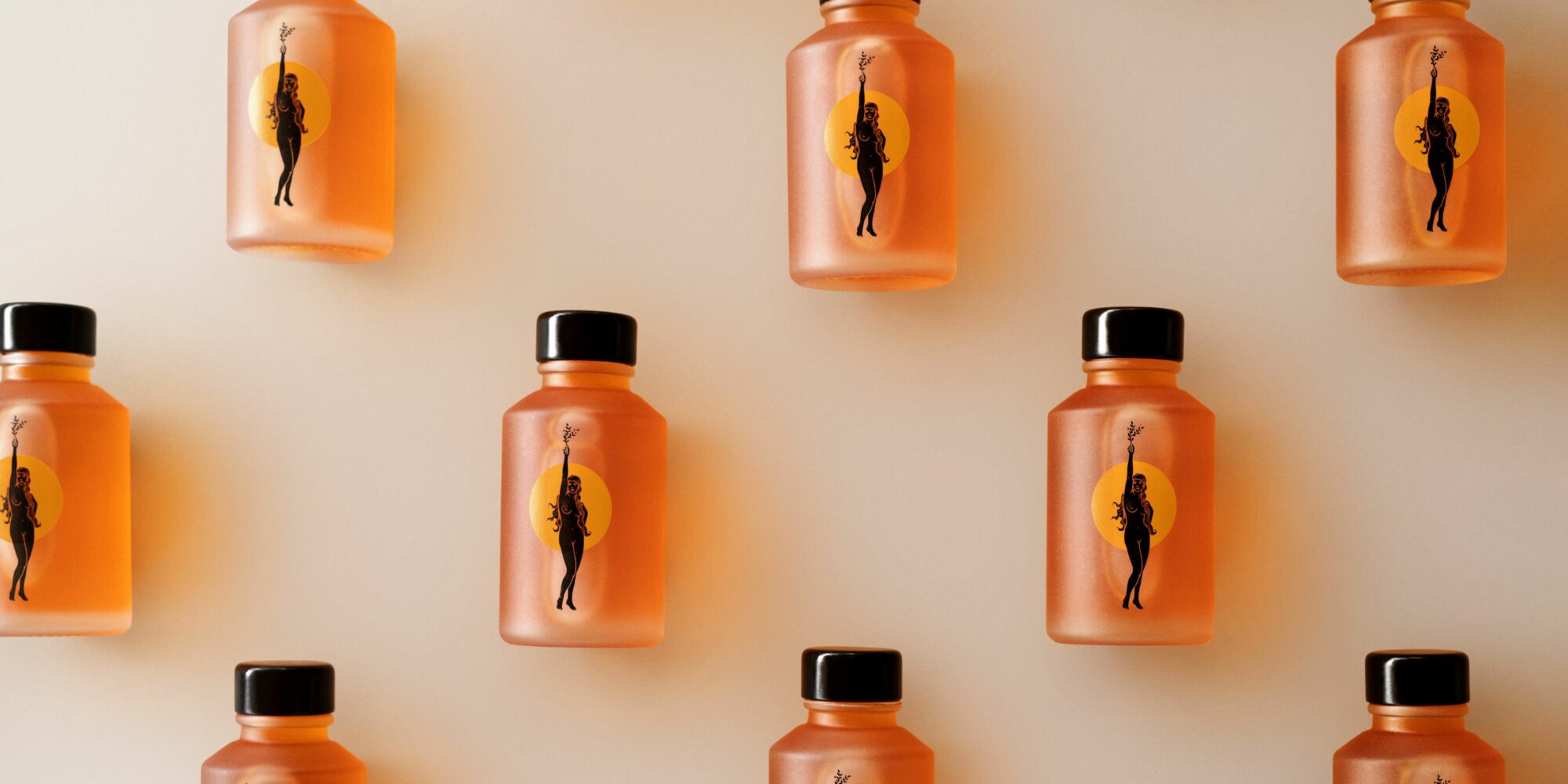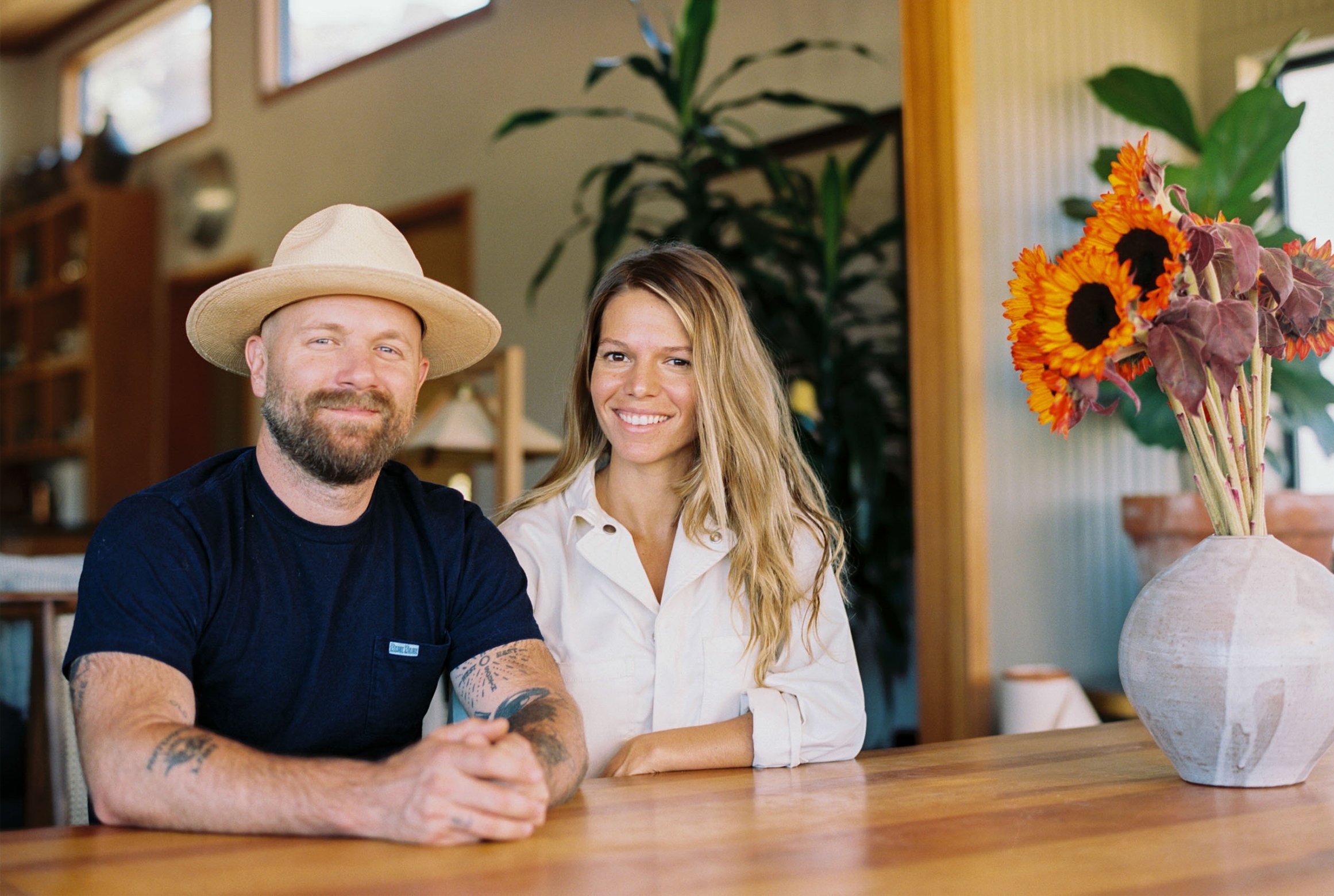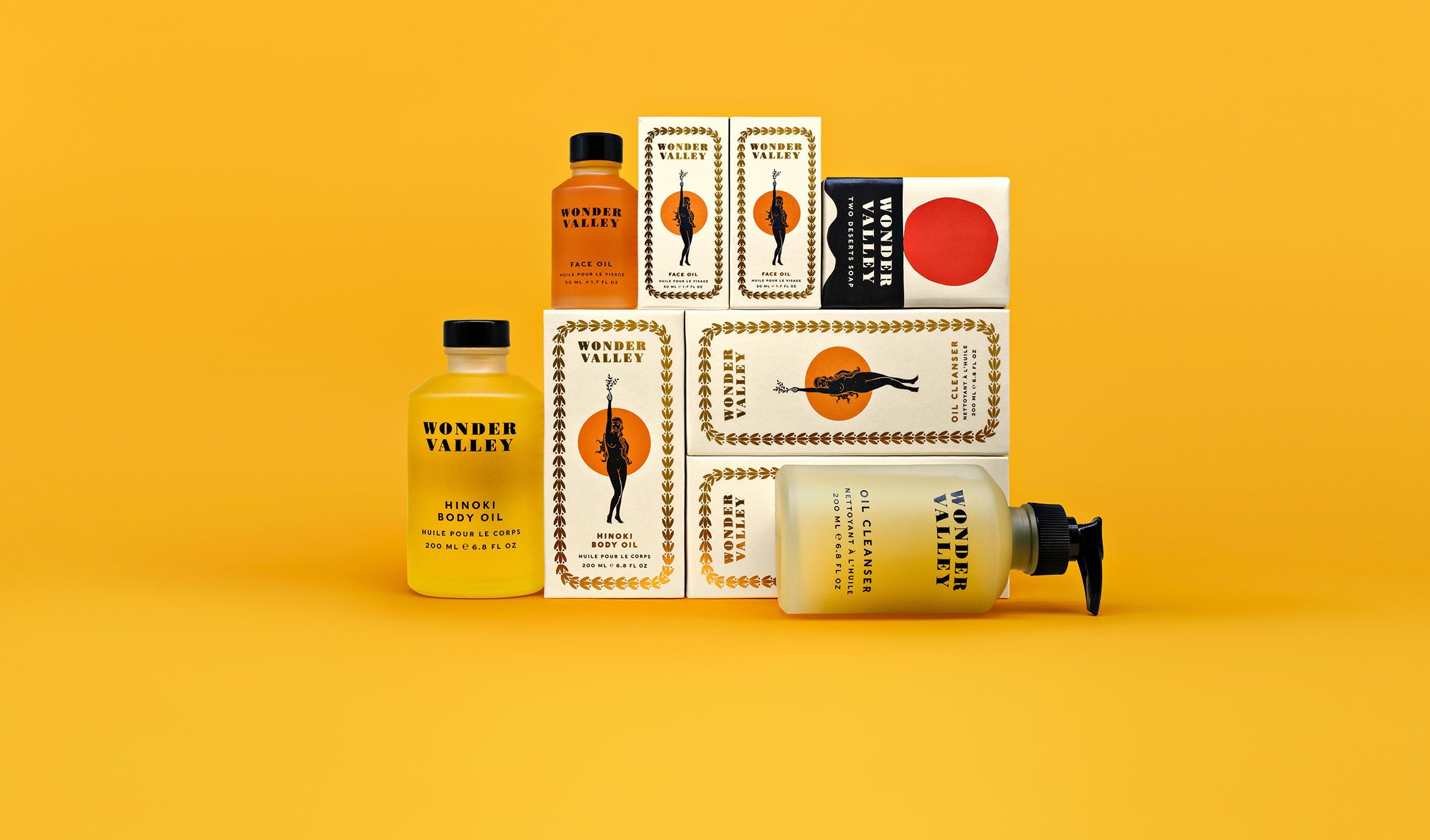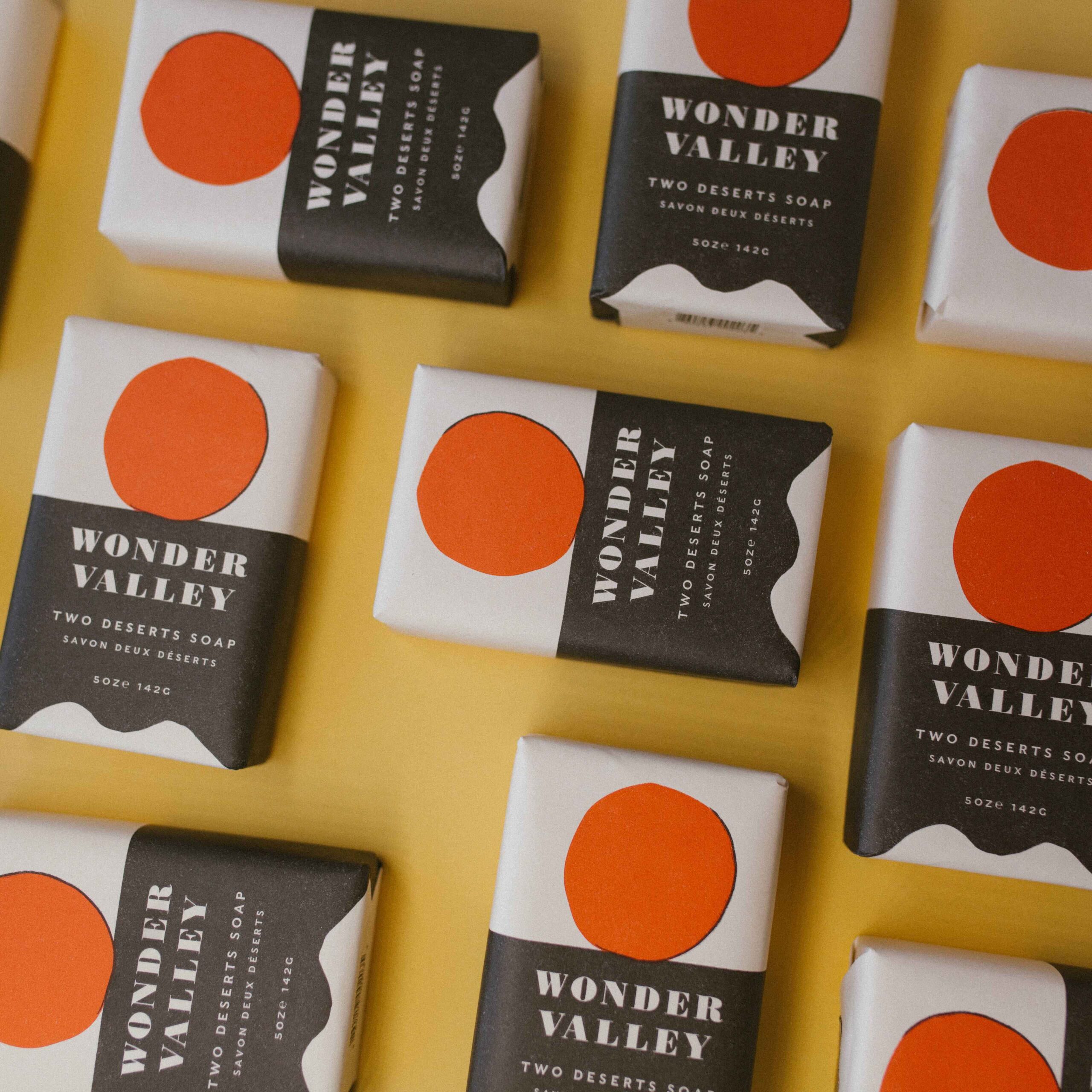
Wonder Valley’s Alison Carroll On Letting Go Of Strict Expectations And The Joy Of Packaging Material Limitations
At some point in the short history of cool direct-to-consumer brands remaking consumer categories, entrepreneurs turned their sights to olive oil. There are sustainable chic olive oil brands like Onsuri, Brightland and Citizens of Soil, CBD-tinged players such as Herb&Olive, Sant’Ana and Potli, and the snazzy squeezable upcoming EVOO entrant Graza. Before them all, there was Wonder Valley. From the minds of husband-and-wife team Jay and Alison Carroll, the brand, which will celebrate its eighth anniversary this year, brought unmistakable design, grove-to-goods verticality (its oil is from olives cultivated on land in California’s Lake County), and a careful approach to new merchandise to the olive oil business.
And, in a divergence from its DTC competitors, Wonder Valley introduced beauty, first with face oil and now with a curated collection that’s expanded to soaps, body oil, oil cleanser, serum and exfoliant. “We are trying not to put unnecessary fluff out there and are just focusing on what are beneficial practices that could be great for everyone,” says Alison Carroll. Beauty Independent talked to her late last year about the road to Wonder Valley, sustainable packaging, the challenge of delegation and why she’s happy the future of her brand isn’t predestined.
Where are you now?
We live between Joshua Tree and a place on a small island in Maine, which is where my husband is from. We split our time 50/50, and we drive back and forth. We are in Maine for the summer into fall, and we come back to the desert for the fall into the spring. My dog and I do this every year. Right now, I’m currently in Arkansas. We are just here for the night, and we are ultimately going to take a long break in El Rey Court, which is a hotel we are partners in.
How did Wonder Valley start?
I was the marketing director for the California Olive Oil Council. It was a perfect marriage of my passion for food and agriculture mixed with my marketing background working at agencies on the East Coast. The role was really unique. It was at a nonprofit that overseas quality control for the state of California. In the state, 400-plus olive oil producers come together wanting to put transparency and meaning into the word “extra virgin.” They do it through a professional olive oil taste panel. There are organizations applying the same principles and practices elsewhere in the world.
My role was to oversee the taste panel. I made amazing mentors on the taste panel, and in every facet of olive oil production, millers, picking crews, equipment providers. It just felt like coming home when I started working in the industry. I felt privileged to have access to the best in olive oil. I worked there for a number of years overseeing the panel, and acting as an industry advocate and educate.
It was my husband’s idea to start our own company working with contacts I had made. It was a very exciting industry that was blossoming. We saw a lot of parallels to the wine industry in the ‘60s. We really wanted to celebrate the California roots of olive oil, provide new education on the word “extra virgin” and reach a new audience. We started in 2014 with the classic black bottle that people know us for.

What was it like to launch the brand?
We were open to seeing where it took us. We started it with just the two of us and, for a long time, it was just two the of us. We put passion before anything else, before a formal strategy or expectations for how much product we would launch. We have continued with a lot of thoughtfulness to try to put intention into our products and our marketing. We are challenging the way business should be done.
I think living in this remote rural environment in the desert was part of that, giving us both mental and physical space to grow the brand how we dreamed it would be, to take our time with it and to have relatively low overhead doing it. All of those things were unique and really let us have a slower pace to it and a lot less pressure as business owners to have to a certain amount of output and expectations off the bat that can kind of kill creativity.
For example, it was not our intention when we launched to have a skincare line. That came organically as an extension of us learning more about olive oil and its applications as a topical ingredient. It certainly wasn’t what we set out to do like, “Year three, we are doing to do skincare.”
Why did you decide to do skincare?
I’m doing this ultimately for myself, and the skincare started from a deep dive into my own skin struggles. I’ve always had pretty acne-prone skin. I tried everything growing up and went to a conventional dermatologist route for my acne. It just made the problem worse. Around the time I started Wonder Valley was also the time where I was starting to understand holistic health and the value that my gut plays in my health and what the microbiome is.
I started experimenting with oils for my skin, which was so counterintuitive from growing up in the ‘90s with oil-free products. I started making our face oil for myself first, and I started reading a lot about plant extracts and oils. Oil just felt like a natural medium for me to create in. I started seeing dramatic results for myself, and it snowballed from there.
I remember a very strong fearfulness in launching the skincare line because it felt new to me being known for a culinary-based product. There wasn’t a lot of peer brands doing that. We were afraid of what that could mean for our olive oil business, but we leaned into the holistic conversation we could have around skincare, having conversations about diet considerations, sleep and personal sensitivities, all the things that could show up on your face. It feels wonderful to offer products that can support internal and external health.
What did you think about entering a skincare market with a lot of face oils?
It definitely felt like a saturated market. Oils were picking up traction, but we felt that we had something to offer. I don’t think there’s greater transparency you can have with an ingredient more than actually growing it. That felt special. We really wanted to create products that were more elemental, that benefited all skin types, all people.
A big part of it is the scent. I’ve had tomboy sensibilities in my perfume choices. There were a lot of beautiful products out there, but none of the scent profiles felt like what I wanted to put on my face. Ours has frankincense, cedarwood, neroli and chamomile. Scent profiles are a big part of what we were offering.
Also because we are so aware that, in creating olive oil, we are participating in a practice that goes back thousands of years, we wanted to bring newness to that. There’s something amazing about this enduring superfruit. Our branding has a nod to the old-world past while having newness, and we wanted to bring that to skincare as well. We are all washing our faces, moisturizing our skin, taking showers and cleansing ourselves. We wanted to make those everyday tasks special.
Where have you been selling?
We have always found new shelf space for olive oil. We are at specialty grocers like Erewhon, Bi-Rite and Marlow & Daughters, but we have also carved out spaces where there isn’t olive oil like clothing, home and lifestyle stores. Right now, we are at the MOCA gift shop.
We have some stores that have both olive oil and beauty, some that have just olive oil, and some that have just beauty. It makes sense that the General Store in San Francisco would want olive oil and skincare. There are many stores, whether it’s CAP Beauty, Lemon Laine or Moon Juice, that both offer edible nutritional products supporting internal health and external products with clean beauty ingredients. Those stores tell our story well. It’s opened up new audiences. Some people know us for the olive oil, some know us for the skincare, and some for all of it.
Where did the iconic look of the packaging come from?
My husband has a strong background in art and creative direction working for a lot of fashion brands and agencies in the past. So, the branding came from him. We looked to old-world references, almost Greco-Roman sirens and goddesses. That was a big inspiration, but then we didn’t want it to feel stuck in the past. It was that marriage of California minimalism with old-world roots. We have this ancient siren, but also the bright California son. Right now, I’m wearing an orange sweatshirt and black pants, so I guess that maybe that’s my color palette naturally.
You had a shop in Joshua Tree. What happened with it?
We did have a shop in Joshua Tree for almost three years, and we closed that after the pandemic, not necessarily because of it. Over the past few years with the growth of our skincare line, we have had a pretty large uptick in wholesale and DTC growth, and a big thing for us is we were getting our certifications to sell internationally. During the pandemic, we started selling in Canada. We have distribution in Japan and a sales team in Tokyo. That’s all relatively new, and we are super excited about it. We are seeing a lot of growth specifically in skincare.

How do you plan to expand the skincare business?
We have been slowly mapping it out. We are a small team, and we move at the pace we move. This year, we launched an exfoliant that’s meant to be a companion to our cleanser, which is a bestseller for us. You can tailor the amount of exfoliation and pressure you want depending on your need. The goal is to be supportive of individuals’ needs and to empower people to have an intuitive read on their skin.
What does it mean to you to be “regenerative”?
That’s something that keeps me up at night. It’s been a practice since day one for Wonder Valley, and it’s reflective of my and my husband’s personal beliefs. Since day one, our olive oil has been plastic-free. We have found a creative solution to have an anti-tamper device that is not plastic, but instead made out of compostable wood pulp. We have gone down deep dives to push our vendors to find new materials.
We have some bath-related products that we are developing and, for the past year, it’s been a deep dive into bioplastics and ocean plastics. I don’t take our role lightly. If we are successful and we are selling thousands of products, that’s thousands of units of little packaging that go on the earth’s surface because of us. I think about that and the life cycle after the customer is using it and how can we push ourselves to be better.
What did you learn about alternative plastics?
I don’t claim to be an expert on this, so this is just my understanding. A lot of the alternative plastics that are plant-based have a ton of potential, but it is all about how you dispose of them. Most of us don’t live in municipalities that have a recycling plant that can dispose of them. It’s not like you can dispose of a sugarcane plastic, and it’s going to break down like sugarcane. If it just ends up in a recycling facility with everything else, it will gum up the system. We have been looking more toward aluminum.
It can be part of the creative process to embrace material limitations and present beauty in totally new packaging than the category has seen before. I think we did that with our olive oil off the bat. That was a very atypical bottle when we launched it. The exfoliant packaging was inspired by trips to Japan. When you go into most ramen places, they have these ubiquitous chili peppers where you twist the lid, and you can tap it out. That was the muse for our exfoliant packaging, and we custom-made our own. We have fun with the process of creating the packaging.
What expectations do you have for 2022?
We obviously have financial goals and growth objectives, but I don’t think it’s so rigorous. More energy is going into what newness we want to see in the product line, what parts of the world we can open up and how we can continue to build our team. Currently, we are at six people.
Things are shifting rapidly in this pandemic world and having a white-knuckled grip on what you expect things to look like is a quick way to burn out. Right now, a lot of flexibility and open-mindedness is required. If you talked to me two years ago, I would have told you we want to open up more retail spaces. That’s not the priority now. Instead, we are trying to strengthen our wholesale partnerships, recreate our online experience, and connect deeper with our existing customers.
Is there a typical day for you?
Nothing is typical, but there is a similar flow that happens whether we are in Maine or in the desert. There’s a pretty good chunk of the day spent doing Wonder Valley-focused work, ranging from product development to managing our team. We have a great sales team in LA that I connect with, but I hope that every day we are putting down our phones and getting outside, whether that’s on a boat, swimming or taking a hike. We have it set up in both places to have an immediate transition from work to not working and nature plays a big part in that. I also love cooking, so that’s another big part of the day.
Besides Wonder Valley, what are other brands in your beauty arsenal?
My arsenal is pretty light, to be honest. I have a couple of makeup items that I use. I use Kjaer Weis. She has beautiful products. A get a lot of advice from Erin Smith, who is the head of the beauty department at ByGeorge in Austin. She introduces me to a ton of products like clean makeup from Ilia. I think they do a really nice job. I like the lip colors from Noto. [Founder] Gloria [Noto] is a good pal. I’m carrying all of my makeup with me right now. So, it’s right at my fingertips as we are talking.
My bag has roll-on perfumes that I’ve made or that my friends have made. I like to layer scent a lot. Sigil is great. [Founder] Patrick [Kelly] makes beautiful scents. My beauty care has become a lot more simplistic, about unwinding and self-care, which for me means a lot of baths and soaking remedies.

What’s a challenge you’ve had to get through in business?
Getting out of my own way. I think everyone has the capacity to block their own success and growth, especially at a self-funded bootstrapped business. You spend the first years wearing way too many hats, and it’s easy to get attached to that and think that no one is going to do it better than you. It’s a real Achilles heel. It’s about learning how to grow a team. That’s a muscle I’m still trying to strengthen.
Where do you think Wonder Valley will be in five years?
I truly don’t know. I say that with a lot of happiness. I’m really open to the process. I’m confident we are going to be growing and expanding. I love the opportunity to have retail spaces and interact with people in real life. I just don’t know what that will look like, and I’m OK with that. The hard part of the pandemic is that it clipped wings on how you can dream because so much shifted and you had to be so flexible, but we have so much newness that we are excited to launch in the next six months.





Leave a Reply
You must be logged in to post a comment.